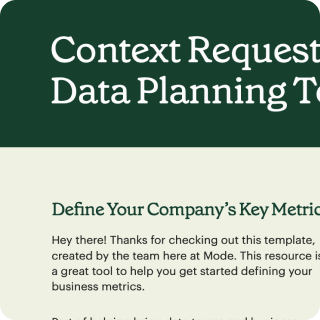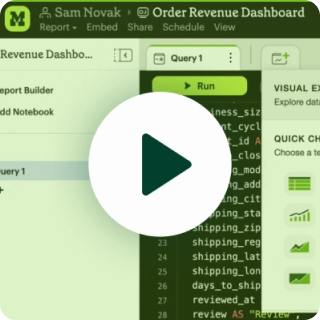Any time you look for patterns in previous experiences or make a tradeoff between one option and another, you're working with analytical skills. Improving these skills is one of the best investments you can make; you can tackle your own problems at work and get closer to answers for your own questions.
The most effective way to improve your analytical skillset is to work on a problem you care about. At Mode, everyone in the company, whether data analysis is a core part of their job or not, is encouraged to apply data analysis to the problems they face. Many of our colleagues have learned skills that make huge improvements in their daily work. In this blog series, we're taking a look at how three of our colleagues here learned analytical skills on the job. We’ve already spoken to Alexa Guerra, Senior Manager of Demand Generation, and Brian Libicki, Senior Product Manager. Today, we'll talk about finance.
Christin Price, Strategic Finance and Operations Manager
Getting acquainted with Mode
Prior to Mode, Christin Price worked in economic consulting, where she primarily used SAS to structure data and build econometric models used in commercial litigation. From there, she went on to work for startups as an operations generalist.
“I learned early on in my career that the quality of the underlying data is what determines the quality of your work, not the model specification. 90% of the work I was doing was becoming acquainted with the data and then cleaning it based on what I'd learned,” Price said of her time in consulting. At her startup gigs afterward, “I was living in Excel, building financial models and projections.”
When Price came to Mode, she began by applying her skills as an Excel wizard to explore revenue and operations questions to inform Mode's strategy and answer ad hoc questions from the board and investors. But she quickly realized there were many opportunities to increase her impact using SQL.
“It's usually pretty obvious early on whether a question should be answered with Excel or with a query,” Price said. “I didn't have the skills right away to start answering those SQL-oriented questions myself, but I saw the potential.”
From Excel to SQL: Identifying legacy customers
One of the first examples of a question that begged to be answered with SQL was identifying legacy customers that were on outdated month-to-month pricing plans. Despite their small monthly payments, some of these customers had the potential to command very high contract values based on their usage. She wanted to make sure that all those customers had an account manager assigned to them so that they could receive special attention and transition them to the modern pricing structure and feature set.
“This question could have been answered in two ways,” Price said. “I could build a report within the Salesforce UI and then merge it with historical usage information in Excel, which is clunky and frustrating and would have taken me a while. Or, with a Definition and a merge in Mode, I could generate a better report in seconds.”
So, she took matters into her own hands and got her hands on the data through Mode's SQL Editor.
“I investigated what the tables themselves looked like. I looked at how they relate to each other and how other people had utilized them in their reports to identify and properly integrate the data I needed. And of course, I asked a lot of questions,” Price said. “I got the report delivered quickly, but I also gained a much deeper understanding of the actual data structure underlying Salesforce and our in-house billing and subscription portals.”
“Since then, I've been able to come up with new ideas to improve the way we collect data for other metrics, which will require less maintenance moving forward, thanks to the fact that I know what the data itself looks like.”
Mode helps Christin get ahead of data quality issues
Her hard-won knowledge came in handy just a couple months later, when it was time to produce historical revenue numbers. An old Excel table built by Derek Steer, Mode's founder and once an analyst himself, didn't quite match with data coming out of Salesforce.
“Before, I would have had to export the data from Salesforce into Excel, and experiment with various matching formulas to find all the places we needed to reconcile records. But instead, I was able to use SQL to identify the heart of the problem, instead of resorting to short-term fixes. The Mode report I built is flexible enough to point out any discrepancies on an ongoing basis and help us get ahead of data quality issues before they balloon into a bigger problem.”
Today Price spends, in her words, “a lot less time in spreadsheet land” than she did when she first started at Mode.
“I'm bringing a better toolkit to the problems I need to solve these days, and I'm becoming more effective at creating more permanent solutions thanks to the fact that I have an understanding of the state of the data itself.”
Her mission now is to create a foundation for Mode’s future by making her job function fully scalable.
“I will rely 100% on building out reporting tools and data quality checks in Mode,” Price said. This is something she could only do now with her deepened skillset and familiarity with Mode's data. “There is no way I could achieve this using Excel. But with Mode, I can automate and set up most of the work so that it is intuitive for other people to engage with. I can accomplish on a short time horizon what would otherwise be an impossible task.”






